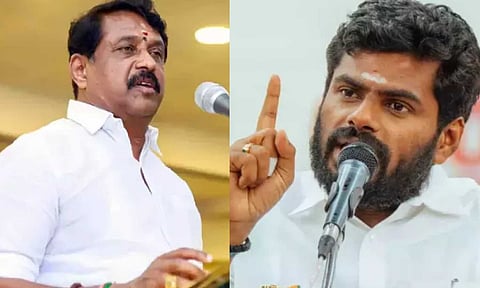

CHENNAI: The political dynamics within the Tamil Nadu unit of the Bharatiya Janata Party (BJP) are undergoing a noticeable shift, as the party grapples with internal realignments amid its alliance with the All India Anna Dravida Munnetra Kazhagam (AIADMK).
The sharp contrast in political styles between newly appointed state president Nainar Nagenthran and his predecessor K Annamalai has brought to light an emerging divergence.
While the senior leadership, including Nainar Nagenthran, has taken a calculated and non-confrontational approach to protect the delicate alliance, Annamalai has continued to chart his own assertive course.
His rhetoric and actions suggest a parallel strategy aimed at establishing the BJP as a self-reliant political force in Tamil Nadu — one less dependent on the AIADMK and more aligned with the central leadership's long-term vision.
Speaking to DT Next, a senior BJP functionary underscored that Annamalai has remained unwavering in his ideological stance, even after stepping down as state president.
"Annamalai was present when Union Home Minister Amit Shah publicly reaffirmed the BJP's alliance with the AIADMK. The announcement, made in the presence of AIADMK general secretary Edappadi K Palaniswami, was a clear signal of unity. Yet, on the same day, Annamalai resigned from his post, making way for Nainar Nagenthran. Since then, he has remained active within party circles, often articulating views that resonate with the BJP's central command—even when they diverge from the alliance's short-term priorities,” the leader said.
This divergence became more apparent when Annamalai publicly remarked that the alliance lacked sufficient electoral strength and would only be viable if rooted in effective governance.
Though this perspective aligned with Amit Shah's emphasis on performance-oriented politics, it reportedly caused unease within AIADMK circles, particularly among the second-rung leadership who viewed the remarks as a challenge to coalition unity.
Party insiders noted that the BJP's state leadership is increasingly split between two schools of thought — one advocating for the continued alliance with the AIADMK as a pragmatic electoral strategy, and the other, by Annamalai, pushing for a gradual disentanglement to build an autonomous BJP base in the state.
"Our high command entrusted Nagenthran with the task of ensuring that the AIADMK remains within the BJP's strategic orbit. He has adopted a cautious, measured tone aimed at avoiding confrontation. Annamalai, however, continues to project himself as the voice of ideological clarity, pressing the AIADMK to deliver results and asserting the BJP's independent relevance in Tamil Nadu," another senior party leader explained.
Highly placed sources within the party's high command confirmed that while the BJP seeks to retain the AIADMK within its sphere of influence, it is also preparing for a future where it may have to contest elections on its own strength.
"Annamalai appears to have understood this dual-track strategy. His proactive political stance—though viewed as provocative by some—aligns with the broader vision of building a strong, self-sufficient BJP in Tamil Nadu, " said a senior national leader.
This calculated assertiveness, however, has not been without consequences.
According to sources, several state-level leaders are growing increasingly wary of Annamalai's independent manoeuvring, fearing that it may destabilize the alliance at the grassroots level and lead to friction between BJP and AIADMK cadres.
"There is apprehension that his unilateral political actions could complicate future electoral negotiations. However, his growing popularity among the party's youth and grassroots workers cannot be ignored," a party strategist noted.
Annamalai supporters argued that the BJP can no longer afford to play second fiddle in Tamil Nadu and must invest in building an independent cadre capable of mounting a credible challenge to both the AIADMK and the DMK.
A close aide to Annamalai elaborated, "He has his own distinct style of functioning, which doesn't always align with the more restrained approach adopted by Nainar Nagenthran. We are not here to serve the AIADMK's interests. Our goal is to grow the BJP as a self-reliant political entity that can challenge the status quo. An alliance is only a means to an end, not the end itself."
As the party navigates this internal duality, a section of leaders believe the BJP's Tamil Nadu unit is at a defining crossroads.
Commenting on the internal dynamics, Ponguleti Sudhakar Reddy, BJP's national co-in-charge for Tamil Nadu and Karnataka, told DT Next, "Every leader has their own style of communication, and Annamalai is no different. He remains deeply engaged in party activities and represents the central leadership's vision in various forums globally. There is no internal discord — our focus is on delivering effective governance under Prime Minister Modi. We are confident that our alliance will secure victory in the 2026 Assembly elections and bring transformative governance to Tamil Nadu."